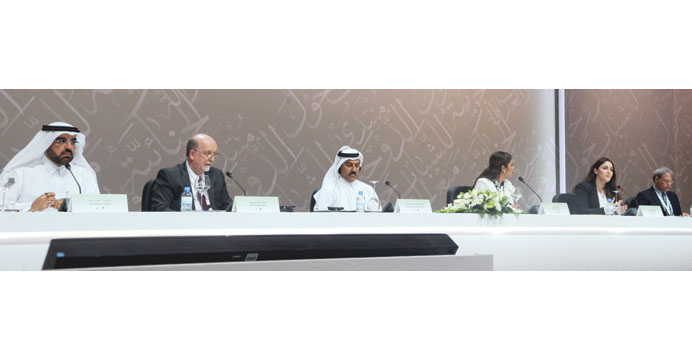By Joey Aguilar/Staff Reporter
Cybercrime has become the most dangerous crime faced by the international society today, said Dr Ahmed Hassan al-Hammadi, director of the Department of Legal Affairs at Qatar’s Ministry of Foreign Affairs (MoFA).
Speaking at the panel session of the Doha Youth Forum on Crime Prevention and Criminal Justice yesterday, Dr al-Hammadi told participants that many illegal acts can now be done using the Internet.
“Exploitation of kids, prostitution, smuggling, illegal drugs (focusing on regional groups), and many other crimes can be done through the Internet,” said Dr al-Hammadi, who is also an ambassador at MoFA.
In most cases, the unscrupulous individuals and groups operate from their houses, offices or by using mobile devices (such as smartphones).
While globalisation has eased various ways of communicating, transporting and trading, the speaker pointed out that groups like criminals are taking advantage of it.
“Globalisation is a two-edged sword. The solution is that the state should not confine itself to the current treaties or conventions but rather to develop them in order to deal with the exploitation of the Internet,” he stressed. “We should face these challenges at large, the modern crimes are so many.”
Dr al-Hammadi said they started preparing for the Doha Declaration two years ago. While the Qatar embassy in Vienna met with the United Nations (UN) Office on Drugs and Crime in November, Qatar has been communicating with several countries around the world to establish what should be included in the declaration.
The discussion also covered a range of topics including the Doha Youth Forum and the upcoming UN 13th Congress on Crime Prevention and Criminal Justice.
Taking place for three days at the Qatar National Convention Centre, 120 student delegates are working together at the event to come up with various solutions to global issues on crime prevention and criminal justice.
At the panel session, Dr al-Hammadi was joined by Lulua Asaad, associate programme officer at UN Office on Drugs and Crime in Vienna; Professor David Mednicoff, director of Middle Eastern Studies and accelerated Masters in Public Policy programmes at the University of Massachusetts – Amherst; Mark Richmond, director of Protect Education in Insecurity and Conflict, a programme of the Education Above All Foundation based in Doha; and Dr Hassan al-Sayed, professor of Constitutional Law, College of Law at Qatar University. He is also a judge at Qatar International Court and Dispute Resolution Centre.
“The topics they are going to discuss at the forum are a replica of what is going to be discussed at the UN Congress,” said Lulua. “What the youth will prepare here, at the Doha Youth Forum, and what they are going to finalise is going to be presented before the adoption of the Declaration in front of His Highness the Emir.”
Professor Mednicoff said Qatar is the ideal setting for the UN Congress as the country is one of the safest in the world.
The forum has been jointly organised by Qatar Foundation for Education, Science and Community Development, the Organising Committee of the UN 13th Congress on Crime Prevention and Criminal Justice, and the UN Office on Drugs and Crime.

Dr Ahmed Hassan al-Hammadi (third left) and other panellists at the Doha Youth Forum yesterday.
